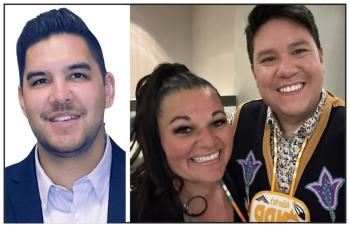Image Caption
Summary
Local Journalism Initiative Reporter
Windspeaker.com
Lesser Slave Lake has chosen an Indigenous representative to sit as a member of the governing party in the Alberta Legislature. The last Indigenous member to hold that riding was Pearl Calahasen.
UCP candidate Scott Sinclair took Lesser Slave Lake in the May 29 general election. He will join two Indigenous NDP members in the legislature, both elected in Edmonton ridings.
The last time three Indigenous MLAs served in Alberta was from 2004 to 2008 when terms overlapped for Progressive Conservative members Calahasen (1989-2015), Mike Cardinal (1989-2008) and Frank Oberle (2004-2015).
The May 29 general election saw the United Conservative Party (UCP) returned to power with a smaller government, dropping from 63 seats to 49. Forty-four seats were required to form a majority government.
The New Democratic Party (NDP) grew by 14 seats to 38.
Sinclair won by more than double the votes received by his nearest competitor, NDP third-time nominee Danielle Larivee.
Sinclair, who is non-status First Nation, was the only Indigenous candidate for the UCP and becomes the first elected Indigenous UCP member.
Sinclair noted that the riding held special significance to him and dedicated his win to his grandfather Sam Sinclair. The elder Sinclair lost the Progressive Conservative nomination in 1989 to Calahasen, a Métis woman, who served until defeated by Larivee.
“It’s everything kind of full circle that way,” said Sinclair. “I think (my mooshum) would be very proud of me.”
Sinclair credits his victory to both his running a “very good grassroots-style campaign” and the UCP having a strong over-all platform for the region.
The top concerns he heard from voters dealt with economy and jobs, healthcare, and infrastructure needs.
The UCP took 90 per cent of the seats in rural Alberta and the smaller cities. However, the party won no seats in Edmonton (it held one seat in 2019) and gave up seats to the NDP in Calgary. The UCP took 14 of the city’s 26 seats there. In 2019, the NDP claimed only three seats in Calgary.
Still, said Sinclair, “we've been lucky enough to win a mandate from the majority of people. We had a higher popular vote. We won the most seats.”
Five Cabinet ministers from the former UCP government, however, were ousted on election night.
“I think in politics you're hoping to be a part of Cabinet so that you can, hopefully, be a part of the sphere of influence there. But I don't expect the Cabinet position. If I'm given one, I would be super grateful for one,” said Sinclair.
Two-term UCP Indigenous Relations Minister Rick Wilson held on to his seat in Maskwacis-Wetaskiwin defeating NDP candidate and Samson Cree Nation member Katherine Swampy by almost 5,000 votes.
Sinclair says if Premier Danielle Smith decides to offer him the position of Indigenous Relations minister, “I think I would be a great fit, but…I think (being an MLA) that's exciting enough.”
Prior to winning the election, Sinclair told Windspeaker.com that he would work with any Indigenous MLA, regardless of the party, in order to advance Indigenous issues.
“I'm a very collaborative person and I would listen to anybody on any issue, and I would certainly respectfully communicate with the other Indigenous members of the assembly,” he said after his win.
“But I don't consider myself only Indigenous either. I consider myself a really great leader and a person who is relatable to all people in my region. I look forward to representing all of them equally.”
NDP candidate Jodi Calahoo Stonehouse won the Edmonton-Rutherford riding and Brooks Arcand-Paul won in Edmonton-West Henday.
With Edmonton an NDP stronghold, nominating Indigenous candidates in two ridings almost guaranteed Indigenous representation in the legislature.
Past political practise has shown that isn’t usually how parties operate. While numbers of diverse candidates nominated has increased over the years, most more commonly are run in ridings that are not winnable.
“I think what we're seeing is…the acknowledgement that Indigenous people have their place here and we have some young, brilliant Indigenous candidates that really appeal to many different people,” said Lewis Cardinal, chair of the NDP’s Indigenous Peoples Caucus.
“And I think that that says a lot. It says a lot about how Edmonton is really recognizing the importance of Indigenous people in their community.”
Stonehouse, a member of the Michel First Nation and candidate in 2021 for National Chief of the Assembly of First Nations, won her riding by more than 6,500 votes over the UCP candidate.
Arcand-Paul, Alexander First Nation in-house legal counsel, won by more than 3,000 votes over the UCP candidate in his riding.
On election night, Stonehouse introduced NDP leader Rachel Notley when Notley took the stage to deliver her concession speech.
The NDP ran two other Indigenous candidates who both finished a distant second in their respective ridings: Richard Bruneau in Camrose and Tanika Chaisson in Fort McMurray-Wood Buffalo.
With the battle squarely between the UCP and NDP to form the next government, other parties picked up few votes.
The Green Party also ran five Indigenous candidates all of whom placed distant third or fourth in their ridings: Jonathan Parks (Calgary-Buffalo), Cheri Hawley (Edmonton-Whitemud), Heather Morigeau (Red Deer-North), and Tyler Beaulac (Edmonton-North West). Tigra-Lee Campbell, who ran in Vermilion-Lloydminster-Wainwright, finished sixth in a slate of six candidates.
The Alberta Party had two Indigenous candidates: Lynn Lekisch finished fourth in Central Peace-Notley and Patrick Stewart finished third in Edmonton-Castle Downs.
Never miss a Windspeaker article. Subscribe Today to our new Windspeaker Newsletter!
Local Journalism Initiative Reporters are supported by a financial contribution made by the Government of Canada.

